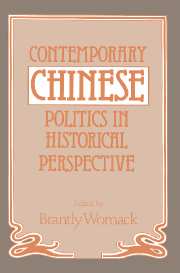7 - China's search for its place in the world
Published online by Cambridge University Press: 03 May 2010
Summary
The premise of this chapter is that at least one of the factors affecting China's (often unpredictable) foreign-policy behavior since the Chinese Communist Party (CCP) seized power in 1949 has been an attempt to find a suitable place for itself in the modern world, a national identity. Approaching the modern international system with memories of a glorious traditional status as regional hegemon, followed by the humiliation of defeat and parcelization at the hands of perceived inferiors, China was accustomed to a position of international leadership that it could not sustain in the face of its political decay and scientific-economic backwardness. That sense of sudden degradation of national status gave rise to an ambiguous attitude of admiration and indignation vis-a-vis the arriviste Western powers, in addition to inhibiting adaptation to the hard rules of raison d'etre qua realpolitik that had come to apply to the post- Westphalian “international system.” For much of the first half of the twentieth century, China was “in” but not really “of” the world.
The communist victory made it possible for China to “stand up, ” as Mao put it in 1949. Denouncing the past century of national humiliation in the Marxist vocabulary of imperialism, the evils of China's own regional hegemony could also be forsworn under the rubric of feudalism. Yet that left a conceptual hiatus. Although the communists in fact tapped the animus of nationalism by mobilizing the Chinese people against Japan (and then against America, in Korea), any serious discussion of China's national interests and role or mission in the world was inhibited by the Marxist denial of nationalism's theoretical legitimacy – and by a leadership posture of dogmatic certitude.
- Type
- Chapter
- Information
- Contemporary Chinese Politics in Historical Perspective , pp. 209 - 262Publisher: Cambridge University PressPrint publication year: 1991

